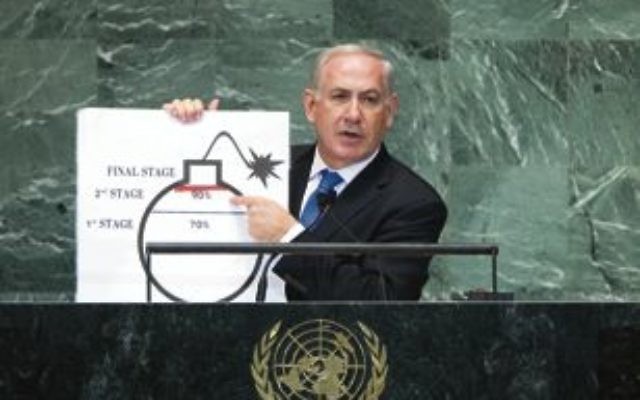Bibi: Iran closing in on red line
Israeli Prime Minister Benjamin Netanyahu claimed on Monday that Iran has significantly sped up its progress towards producing a nuclear bomb by installing new centrifuges.
At the United Nations in September, Netanyahu famously drew a red line on a picture of a bomb, calling for the world to set Iran a clear boundary, past which its nuclear project mustn’t progress.
“I drew a line at the UN last time I was there. They haven’t crossed that line, but what they’re doing is to shorten the time that it will take them to cross that line,” he told a group of American Jewish leaders visiting Israel.
Netanyahu continued: “And the way they’re shortening that time is by putting in new, faster centrifuges that cut the time by one-third, so that Iran is putting itself in a position to cross the red line and have enough material to produce one nuclear bomb’s worth of highly enriched uranium. This has to be stopped, for the interest of peace and security, for the interest of the entire world.”
Addressing the question of how Iran can be stopped, Netanyahu said: “Well, you have to put greater pressure on them. You have to upgrade the sanctions. And they have to know that if the sanctions and diplomacy fails, they will face incredible military threat. That’s essential. Nothing else will do the job. And it’s getting closer.”
Netanyahu’s refocusing on Tehran’s nuclear exploits following an election season during which he said little about the subject seems to be an attempt to ramp up pressure on world powers ahead of their upcoming meeting with Iran. The so-called P5+1 countries – China, France, Germany, Russia, the United Kingdom, and the United States – will go to Kazakhstan on February 26 to negotiate with Iran.
While Iran will attend the Kazakhstan summit, it has rejected the idea of bilateral negotiations with Washington, which US Vice-President Joe Biden said were an option. Iran’s supreme leader Ayatollah Ali Khamenei described people who want talks with the US as “naive”.
Israel fears that the P5+1 countries will take an overly conciliatory tone towards Iran. Britain’s Foreign Secretary William Hague said that they will arrive with an “updated and credible offer for Iran”, explaining: “We want to work with Iran, in the spirit of mutual respect, on the concrete steps needed to address the international community’s serious concerns about its nuclear program.”
Israel is also thought to be concerned that North Korea’s testing of a nuclear weapon this week could convince Iran that it could get away with defying the international community on nuclear matters.
An Israeli Foreign Ministry statement hinted at this fear.
“These actions by the Democratic People’s Republic of Korea (DPRK), in violation of its international obligations, must be met with a swift response by the international community,” it said.
“A clear message must be sent to the DPRK and to other countries, that such activities are unacceptable and cannot be tolerated.”
NATHAN JEFFAY


comments